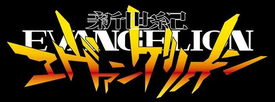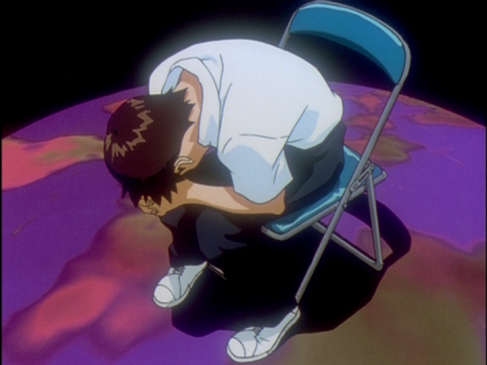In class we saw an overview of postmodernism
and some of its characteristics, evidenced in the two graphic novels we were required
to read. So as not to repeat the same information from other posts, I thought
it would be interesting to take the elements usually associated with postmodernism
and use them to analyze a very popular anime/manga, Neon Genesis Evangelion.

As seen in class, postmodernism is very
skeptical of models, categories, and any claim valid for a group instead of
each person’s relative truth. Reality is
questioned, reality is nothing. The
reality we know is only our own interpretation of the world. In modernity there
is a search for meaning even where there is none. There is a search for truth.
However, in postmodernism there seems to be a lack of optimism of there being a
truth that answers all questions. This was brought on by the devastation of two
world wars. Post modernity is full of questions, which is why postmodern works
tend not to conclude with a neatly tied-up ending.
Postmodern elements can be found in Neon Genesis
Evangelion. According to Anno Hideki, the
creator, evangelion takes place along the following schemata:
The year: 2015
A world where, fifteen years before, over half the
human population perished.
A world that has been miraculously revived: its
economy, the production, circulation, consumption of material goods, so that
even the shelves of convenience stores are filled.
A world where the people have gotten [sic] used to the
resurrection - yet still feel the end of the world is destined to come.
A world where the number of children, the future
leaders of the world, is few.
A world where Japan saw the original Tokyo destroyed,
discarded and forgotten, and built a new capital in Nagano Prefecture. They
constructed a new capital, Tokyo-2, then left it to be a decoy - then
constructed another new capital, Tokyo-3, and tried to make it safe from
attack.
A world where some completely unknown enemy called the
'Angels' comes to ravage the cities.
This is roughly the worldview for Neon Genesis
Evangelion.
This is a worldview drenched in a vision of pessimism.
A worldview where the story starts only after any
traces of optimism have been removed.
And in that world, a 14-year-old boy shrinks from
human contact.
And he tries to live in a closed world where his behavior dooms him, and he has abandoned the attempt to understand himself.
A cowardly young man who feels that his father has
abandoned him, and so he has convinced himself that he is a completely
unnecessary person, so much so that he cannot even commit suicide. (Anno
Hideaki, reprinted in Evangelion Manga accessed 27 January, 2002, originally
from (July 17 1995) Viz Comics.)
The series itself is an example of pastiche
since it combines multiple genres. Ask anyone who has watched the show and they
would say that it is not just your run of the mill mecha (robot) type show.
Although the anime starts out with futurist fantasy and mecha elements, the
central narrative and characters are later devolved and deconstructed. There are a number of allusions to biological
, military, religious, and psychological concepts. There are also references to older anime series. Intertextuality can also be highly evidenced in this
series. However, I will not delve into the topic as it would take up too much
space.
More than the battle with the angels, Neon
Genesis Evangelion is about the battle in ones own thoughts. In the last
episodes of Evangelion reality and individuality are questioned. For example:
“Is this the world where everything is
set?” Shinji (main character) asks his
projection of Misato (another character).
“No,” she replies, “This is the world where
you are the setting.”

Another example is the following
conversation that the main character has with himself:
"Where am I?
What the hell am I?
[speaking to himself] So, you need the
barrier of the mind.
What? It's me. The shape that I show to
others. The symbol representing me. This, and this, and this, all these are
representations of me. Nothing but the things that make others recognise me.
What am I? Is this me? The true me? The
false me?"
Finally, Neon Genesis Evangelion ended
without answering all the questions that had surfaced throughout the series. There
is no neatly tied up ending. Many who viewed the series even reacted negatively
towards the ending as it was too confusing and resolved nothing. We are too
used to having everything answered for us. If watched carefully, the series
actually did have some answers for us, but not the answers of the entire story as a whole. As stated above, there are a number of elements that can be analyzed from Evangelion. This was just a brief overview. I highly recommend watching the series and gathering your own interpretation of the story and how postmodern elements are interwoven into the anime.
I love your post. Evangelion is one of my favourite shows, altough I am pretty certain that I did not understand half of its meaning.
ResponderEliminarMost characters had their moments in which the openly questioned themselves about their existance, their purpose in life, the reality that surronds them, and why they are doing the things they do.
I think that one important event in the show is when Shinji questions himself about why he is piloting the eva. He expresses how scared fighting makes him, how painful it is. But he still does because he was told to do so, because he wanted to please his father and the people from Nerv, because it gave him a place to be, because now he had a role that no one else could take fom him (which was not true because of Rei...). He in a way had little personality and knew very little about himself.
Shinji is actually one of my least favourite characters of all time, but the depth of his thoughts and how he changes is something that people can dedicate many pages analysing.